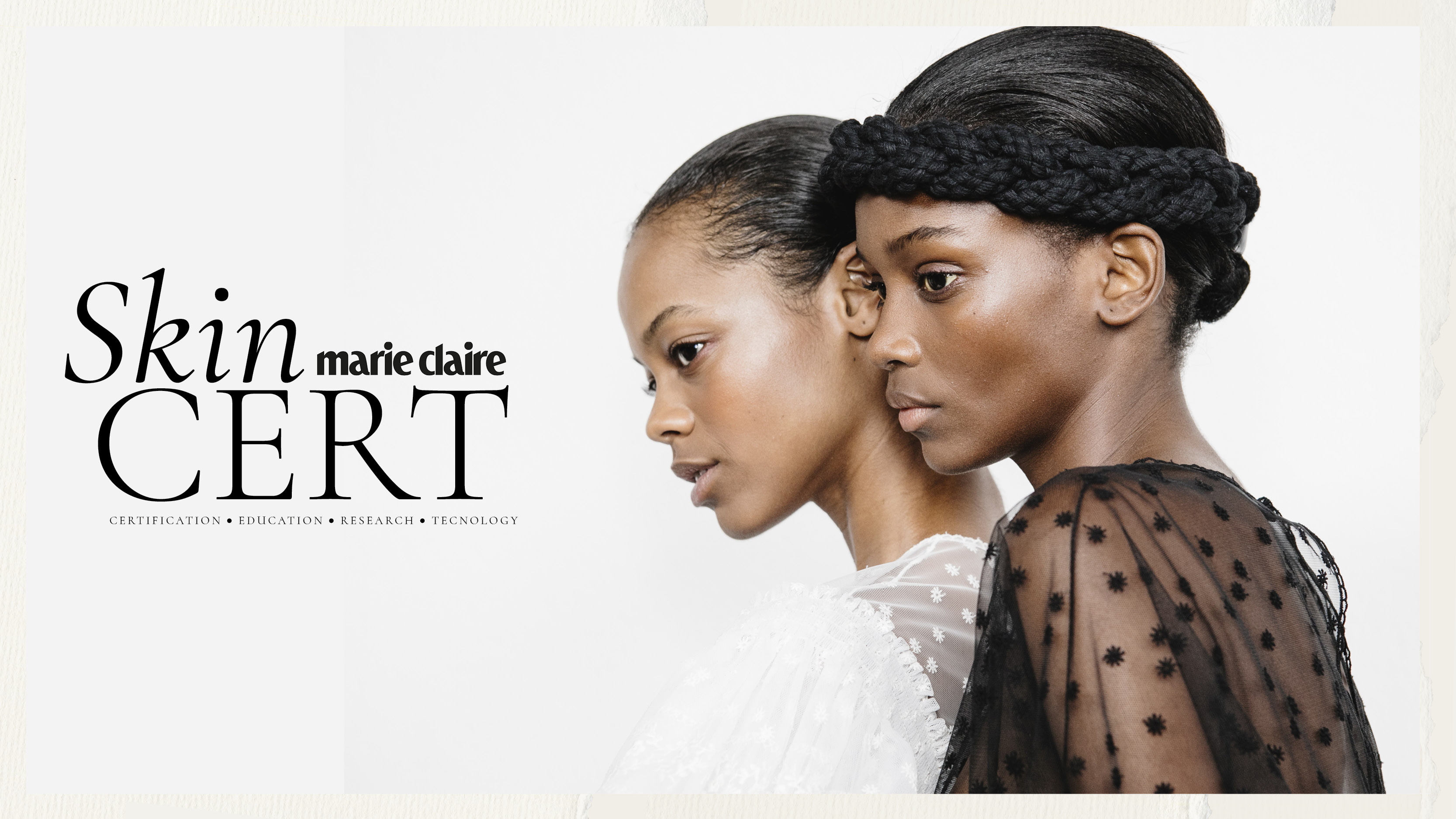SkinCERT: From honest new product and treatment reviews, expert tips and skin advice, you will find all you need to know about the best in skincare
Welcome to SkinCERT


Celebrity news, beauty, fashion advice, and fascinating features, delivered straight to your inbox!
You are now subscribed
Your newsletter sign-up was successful
Welcome to SkinCERT
To us at Marie Claire, skincare is synonymous with self-care and SkinCERT is our new beauty franchise to help you navigate this world, giving you the science, technology and new innovations that you need to make sense of it all. It’s also here to inspire you all to commit to yourselves to skincare everyday, as we believe it really helps not just our complexions, but our mental and emotional health too.
Quality skincare is key as we no longer want to rely on the superficiality of highlighters or concealers but look at skin’s underlying health. We all want products that target specific needs such as rosacea, pigmentation and acne as well as products that strengthen our skin’s microbiome. Let's face it, SPFs and antioxidants are at the top of our agendas more than ever these days.
Here we are focusing on education as it is time we all became more clued up on our own needs so that we buy products that are suitable for our skin type and concerns instead of the latest skincare trend. We aim to give you the confidence to delve into and understand clinical trials, science-backed creds and clinical efficacy, simplified formulations and routines.
Our experienced beauty team will come back with dermatologist and cosmetic doctor-backed answers to your questions and will make sure you can trust every product or treatment review.
Skincare is the trailblazer in the future growth of the beauty industry - and with global sales set to hit £126bn by 2025, it’s worth knowing how to navigate a market that is expanding quickly. Here’s your guide to what’s going to be big, next - and the factors driving the changes:
Only trust a skincare expert
First up, you are likely to notice yet more ingredient focus and transparency available when you buy your face cream. “Ingredient-first indie brands such as the Inkey List are furthering their focus on education, with the brand's London-based pop-up store offering and in-person askINKEY service, where consumers can get the advice of an expert, and also create a skin care profile, allowing them to build a custom routine,” says Amy Rollinson, Senior Beauty Analyst at Euromonitor International. “While social platforms remain a large part of the consumer education journey, influencer trust is waning and consumers instead rely on organic content, mimicking advice from friends and family, or expert advice, with dermatology accounts such as @dermdoctor on TikTok, particularly performing well.”
Celebrity news, beauty, fashion advice, and fascinating features, delivered straight to your inbox!
Treat skincare as selfcare
You can thank the pandemic for this one: we are seeing a rise in all things wellness-related in skincare, with google searches for ‘self-care’ having risen by 100 per cent in the last five years, and, as a result, brands are embracing the ‘inside outside’ approach to skin care, with our faces being a barometer of our inner health – linked to our gut, hormone balance, and psychological well-being.
Know your actives
With the cost-of-living squeeze, we are becoming laser-focussed on value and want hardworking, reparative actives and plant-based ingredients that rejuvenate at a lasting, deeper level. Online searches for specific active ingredients such as azelaic acid, vitamin C, niacinamide, and new trends such as fermented skincare, waterless beauty, mineral SPF, and mushrooms are still rising as we are eager to learn more about the power of science before we spend our money. Celebrity facialist Sarah Chapman has noticed this shift. “High-tech skincare used to be daunting, but now customers are more confident in understanding the results of clinical trials and delving into the science behind ingredients.”
Streamline your skincare
If you have lots of products cluttering up your bathroom, expect to see a move towards streamlining your skincare as we realise too much can have a negative effect on our skin, on our minds, and on the planet. Sunscreen will remain a staple for most (as it absolutely should - it is a vital step to reducing the risk of cancer and of premature ageing).
“Nowadays, you can easily pick up potent skincare ingredients and be told how to use them by unqualified and inexperienced influencers. Actives are good, but people are mixing too many, overusing them, or using a higher strength than necessary causing havoc for the skin. We will be seeing more targeted but kinder skin routines, says skin expert Debbie Thomas, founder of D.Thomas Skin Specialist Clinic. “If you can't get to a professional then simplify your routine. If you like the sound of a new ingredient, introduce just one item at a time and start slowly with products like acids or retinol. Actives are not the enemy; bad advice and inexperience are.”
Zoom boom tweakments
Then there’s the post-pandemic professional skincare boom as a result of ‘Zoom face’; “constantly seeing your face ‘live’ on screen isn’t something we are used to," says Dr Ifeoma Ejikeme, founder of Adonia Medical Clinic. "We start to analyse our facial expressions, the way we talk and start to notice every line, wrinkle, spot or saggy bit. I have seen a huge rise in people seeking treatments to improve the neck and chin area, which is clearly to do with the unflattering angles created by forward facing cameras. Under eye circles caused by volume loss are also a requested area for treatment, which are highlighted by poor lighting. This has led to the rise of treatments such as Profhilo, hyaluronic acid which helps to hydrate the neck, HIFU: skin tightening procedure excellent for boosting collagen firming and Microneedling with radiofrequency, excellent for tightening.”
Explore the mind-skin connection
Psychodermatology is a growing field in treating stress-related skin issues. The normalisation of conversations around mental health has accelerated thanks to the Gen Z-ers who are more likely to open up about their psychological concerns. This year, mental health is a huge focus for beauty companies as we look for products that offer moments of calm and sensorial experiences through touch, fragrance and texture to support mental and emotional well-being.
“You can’t deny that a beauty ritual at the beginning and end of our day helps induce a feeling of calm, relaxation, a sense of control, and more emotional balance,” says psychotherapist Lee Pycroft, who also works as an A-list makeup artist. “Plus, looking after your skin can build confidence and the act of caring for yourself can boost feelings of self-worth.”
Brands that put mental health at the top of their agenda include Plenaire, a skincare line for teenagers, which embeds positive messages within its products and packaging, showing diverse faces, people with disabilities and others in highly vulnerable positions. Namrata Nayyar-Kamdar, the founder is a firm believer that mental health is intrinsically linked to skincare and noticed that the language used by brands to target youth was also outdated.
Psychotherapist Charlotte Ferguson founded London-based skincare brand Disciple: “Unsurprisingly factors such as anxiety and stress can have a negative impact on your complexion; acne, eczema and premature ageing are common side effects of demanding lifestyles and over 75% of these skin issues are caused by stress-induced inflammation.”
Key dermatologists have been quoted as saying that at least 40% of their patients' cases are unsolvable without addressing the underlying emotional factors involved.
“While anxiety is the most common condition my patients bring, persistent low mood is a close second and affects the skin in different ways – your immune system is more vulnerable, cell turnover slows and the skin's natural healing capacity is reduced. Pain receptors are more sensitive, meaning that skin conditions such as psoriasis, eczema and adult acne can become more painful, slower to heal, and more likely to become infected. Collagen is also depleted, meaning the signs of premature ageing become more pronounced,” says Ferguson.
Believe ageing is a gift
We are finally shifting away from the ‘anti-ageing’ notion and instead focusing on products that target specific skincare needs like skin sensitivity and dehydration or hormonally-driven changes. Brands are also continuing to use more ethnicity, gender and age-inclusive marketing and are breaking down the myths that skincare needs to be divided into different categories according to the age, sex, and skin type of the consumer.
Laura Cummins, Global Lead of Innovation, Whitespace and Trends at Avon says: “There has been an evolution in the way we think about getting older, as the pandemic made it very clear to us that ageing is a gift. This has resulted in the desire for healthy skin that looks and feels strong, radiant, resilient and glows with vitality for a lit-from-within look that reflects our love for life. We will focus on progress over perfection and nurture our skin from a place of care rather than a place of fear. We have realised that women get so much better with age, why would we want to hide that? We are so much more than what is reflected in the mirror. I like who I am now and I like what I look like, and not only is that ok – it shouldn’t be revolutionary, it should be the norm.”
Welcome biotech ingredients
As we are broadening our skincare knowledge, the desire for potent ingredients offering hardworking ‘nutrition' for skin that rejuvenates at a deeper level through potency, penetration, and preservation rather than trauma is growing.
“The aim of any natural and effective bio-tech ingredient is to be welcomed into skin cell kinship right down to the mitochondria level where possible. It's possible to party crash of course with synthetics masquerading as friends of the family - but why knock yourself out when there are a myriad of naturally symbiotic and gentle other choices?” says Paul Berrow, founder of 320 Mhz, a targeted and clinically-trialed natural concentrates brand.
Debbie Thomas agrees “we will hear more about ATP (skin cell energy), and specific products and treatments that boost ATP that don’t involve traditional trauma (e.g. controlled damage to trigger repair). This means no inflammation. A new generation of professional and home care products are able to activate cell energy, meaning skin rejuvenation without any damage. We offer two new treatments: The byonik cold laser and the Circadia Switch treatment. Both support and trigger ATP without the typical ‘damage to trigger healing’.”
Lisa Oxenham is a trailblazing beauty editor, journalist, stylist, and creative director with over 20 years of transformative impact in the beauty industry. As the Beauty and Style Director at Marie Claire UK, she orchestrates high-profile shoots with celebrities and influencers, creating visually stunning and globally resonant content.
A passionate advocate for sustainability, Lisa serves on the Advisory Board for the British Beauty Council's Sustainable Beauty Coalition and the Media Advisory Board. She is also an ambassador for the Soil Association certification and the Amazon Research Institute. Through her "In The Loop" column, she keeps readers informed about the latest advancements in sustainable beauty and supports brands that champion environmental causes, emphasising the need for the beauty industry to reset its priorities.
Lisa's influence extends beyond words; she directs inspiring short films on sustainability and challenges in the beauty industry and is a sought-after public speaker. Recently recognised in the Who’s Who in Natural Beauty 2023, she also champions mental health and eco-conscious practices, demonstrating that glamour and environmental responsibility can coexist beautifully.
